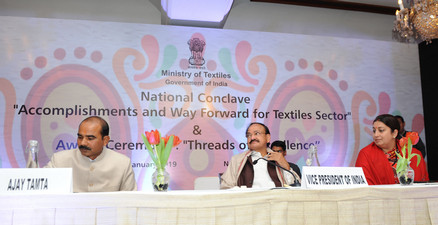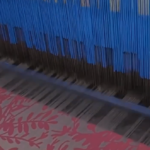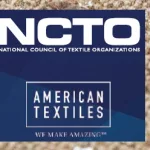Following is the text of Vice President’s address:
“I am extremely pleased to participate in this event on the accomplishments and way forward for the Indian textiles industry, which is playing a pivotal role in the Indian economy. India enjoys a unique advantage of having abundant raw materials and presence of manufacturing in all segments of the textile value chain. The industry is also characterized by the presence of skilled manpower and niche segments with huge global appeal. Thus, the sector is strong and competitive across the entire value chain.
The textiles sector is the second largest industry after agriculture in terms of economic contribution and employment generation. It currently employs over 10 crore people directly and indirectly. Women account for 70 per cent of the total workforce employed in the garmenting sector. The continued growth and global competitiveness of the textiles industry can drive the economy to new heights. However, the sector needs to improve supply chains and internal systems, focus on research and development, cost optimization (saving cost by vertical integration, etc.) and scaling-up to achieve greater competitiveness and command a higher share in the production and export of top items traded in global markets.
I would like the sector to focus on improving quality and on tapping the opportunities in the global market to increase India’s share in exports. This is the ideal time for the industry to discard outdated technology and modernize its machinery to be global competitive.
I understand that India’s export performance has been not up to expectations for a variety of reasons. It cannot be business as usual and the industry has to rise to the occasion and ensure that the share of India’s exports reach double digits from approximately 5 per cent at present. You need to diversify your products and tap newer markets. The availability of raw materials, low cost and skilled manpower is an added advantage for the Indian textile industry, which is expected to reach US$ 223 billion by 2021. A unique characteristic of the India’s textiles industry is its capacity to cater to various segments with a wide variety of products within India and abroad. As such, exports of textiles and apparels from India are expected to increase to US$ 82 billion by 2021.
Various measures taken by the government like allowing 100 per cent FDI and Technology Up-gradation Fund Scheme are aimed at accelerating the growth trajectory of the textile industry.
On its part, the industry should focus on innovation and value addition for improving global competitiveness of the Indian textiles and apparels. Innovation is the key. We have to come up with innovative and exclusive products if we have to expand our footprint in the global arena.
It is time for the textile industry to develop a culture of innovation.

Apart from investing in research, there should also be constant upgradation of the technology. There is also need for new technology to promote waterless dyeing.
Quality has to be the mainstay for India to sustain exports in the global market especially when we are facing stiff competition from countries like Bangladesh and Vietnam. With rising income levels, steady growth of the retail industry, the textiles sector is expected to experience a bright future due to strong domestic consumption as well as increasing demand in exports.
India, recently, achieved a great feat of becoming the 6th largest economy in the world. India has jumped more than 50 ranks up on the ‘Ease of Doing Business’ Index in the last two years. This shows that significant changes are taking place in the Indian business environment. The improved ranking of India in “Ease of Doing Business” is expected to generate more business and attract FDI into India. Many foreign companies have set their sights on India as a future destination of big investments due to availability of technology, cheap and skilled labour and abundant raw material. All this bodes well for the textile industry.
I take this opportunity to extend my best wishes and congratulations to the industry’s stakeholders for their sustained efforts and commitment which has effectively positioned India as the source for textile items ranging from raw materials to finished products and handicrafts.
Today we are here to recognize the contribution and achievements of stakeholders both in industry and Government. I am happy to note that in the last four and a half years, the Ministry of Textiles has made significant policy initiatives and schemes for the textiles sector, which has benefited stakeholders along the entire value chain. I am confident that these initiatives will yield rich dividends in the days to come.





